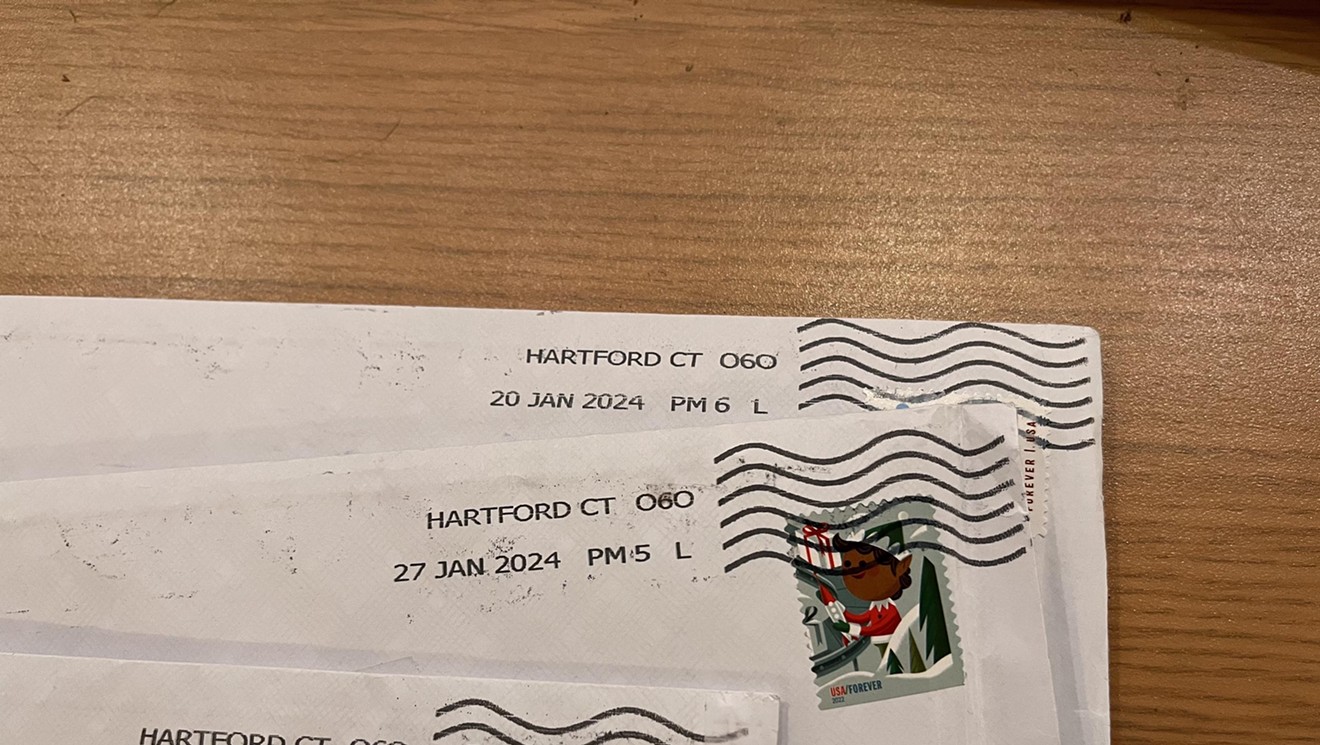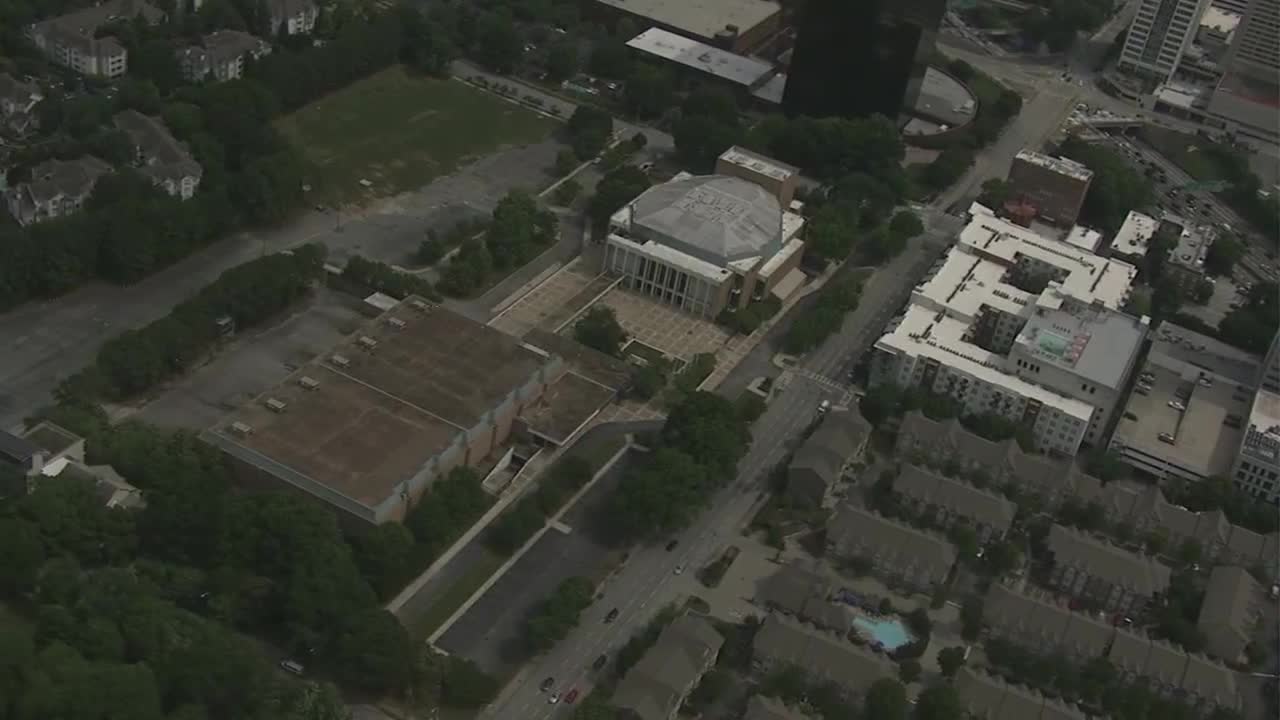World
What are Palestine’s unique Christmas rituals, disrupted by Israel’s war?
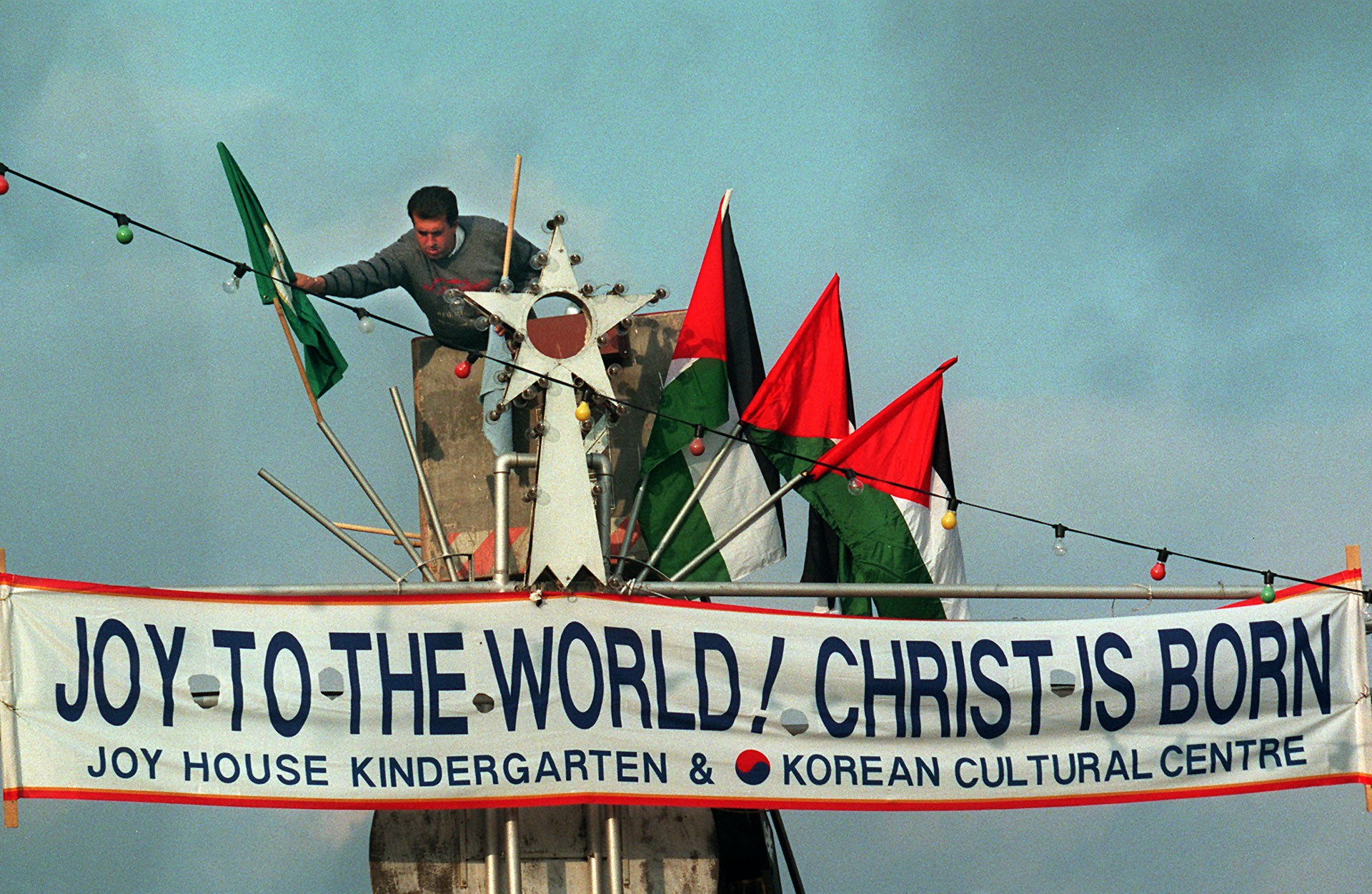
Through carols, cookies and Christmas lights, December 25 is marked by jubilation and celebration of the birth of Jesus for more than 2 billion Christians worldwide.
However, a silent night falls on the 50,000 Christians in Palestine – a number that is in rapid decline.
The safety of Christians in Palestine was shaken by the bombardment of Gaza’s oldest Greek Orthodox Church of Saint Porphyrius in October, which killed at least 18 people including children. Israeli forces also shot and killed an elderly Christian mother and her daughter in a Catholic church in Gaza on Saturday.
This year, the many gleeful rituals that characterise Christmas in Palestine will be replaced by simpler ceremonies, mourning and prayer, shining a harsh light on the current reality of the region. The Lutheran Church, for instance, has the Baby Jesus in a manger of rubble and destruction.
Was Jesus Palestinian?
Many Christian schools of thought believe that Jesus was born in Bethlehem, in the now Israeli-occupied West Bank.
“Jesus was born on our side of the wall,” Palestinian pastor Reverend Munther Isaac told Al Jazeera.
Isaac added that the narrative of the birth of Jesus in Bethlehem is backed by archaeology as well as scripture such as Luke’s Gospel.
“It’s the year 2023, and you’ve got, on Christmas day, all over the world, millions of, so many, hundreds of millions, if not more, of Christians going to church, reading about Bethlehem, singing about Bethlehem and thinking maybe of Bethlehem as a mythical place, as a fairytale, not realising it’s a real place with people, with a Christian community that has kept the tradition alive for 2,000 years.”
What is the story of Christmas?
“While the family of Jesus lived in Nazareth back then, they travelled from Nazareth to Bethlehem for that [census] registration,” Isaac narrated, with thoughtful pauses between his sentences.
Isaac drew parallels between the story of the birth of Jesus and the current situation in Palestine.
“We’ve always been under empires. We’ve always been displaced,” said Isaac, explaining that Jesus was born when Palestine was under the Roman empire.
An imperial decree of the empire ordered the family of Jesus to register for the census in Bethlehem, added Reverend Mitri Raheb, another Palestinian pastor from Bethlehem. King Herod ordered the massacre of infant boys, leading to the family of Jesus escaping to Egypt as refugees, explained Isaac.
According to the Bible, Jesus was born in Bethlehem and then placed in a manger. The Church of Nativity was built at this location and its grotto holds great religious significance, pulling Christians from all over the world into the city of Bethlehem every Christmas.
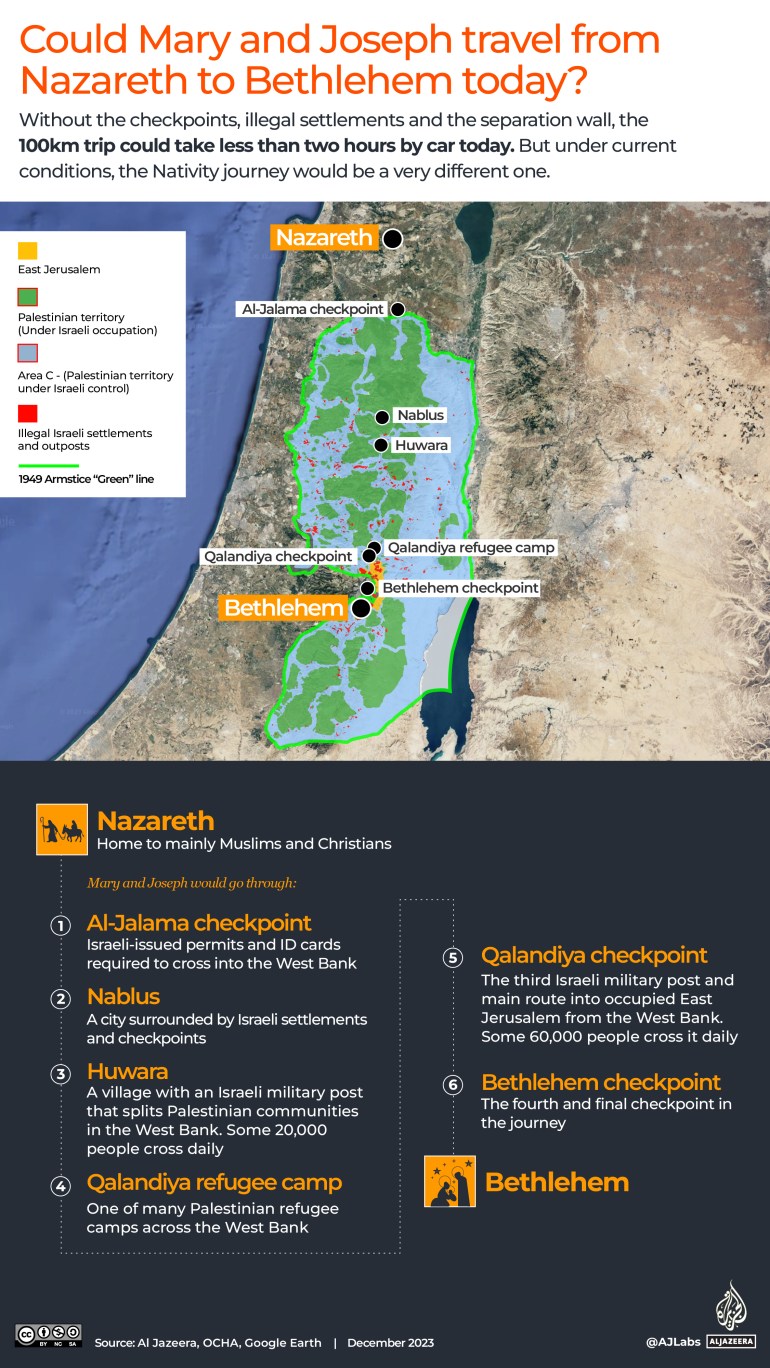
The procession of the patriarchs
One of the most important Christmas rituals in Palestine is the procession of the patriarch from Jerusalem. This procession takes place on December 24 for Catholics and January 6 for Orthodox patriarchs.
The designated procession route that has been followed throughout the Ottoman Empire and the British mandate is now engraved in tradition, Isaac explained. The patriarch is received from Jerusalem in Bethlehem and then the procession walks through the streets of the old town in Bethlehem until it reaches the Church of Nativity, where prayers are held.
Israeli authorities and Palestinian police escort the procession, depending on the territory the procession passes through.

The arrival of the procession is a celebrated festivity, welcomed by several scout groups and musical bands from all over Palestine. People leave their homes to walk around the city and witness the spirit of Christmas.
This year, the bands and scouts will not be present, instead, the procession will be silent.
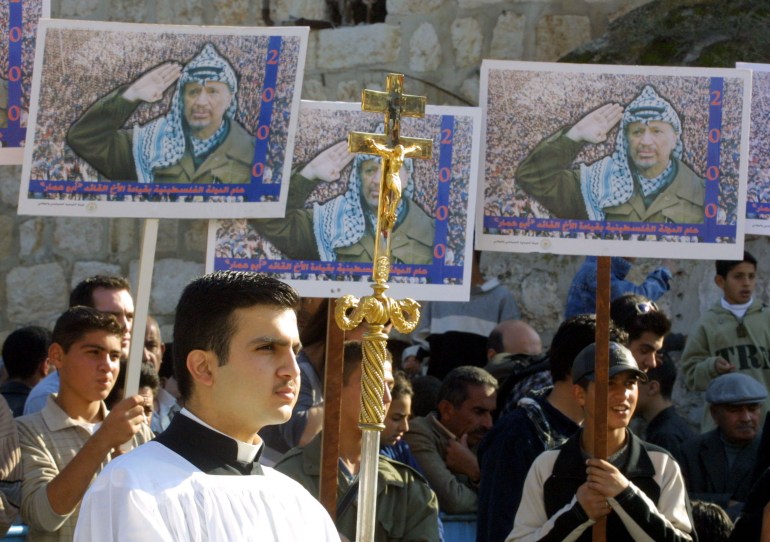
Midnight mass and Manger Square
Once the procession reaches the church, prayers begin at 5pm local time and last until midnight, with the midnight mass being broadcast for the world to see, Raheb said.
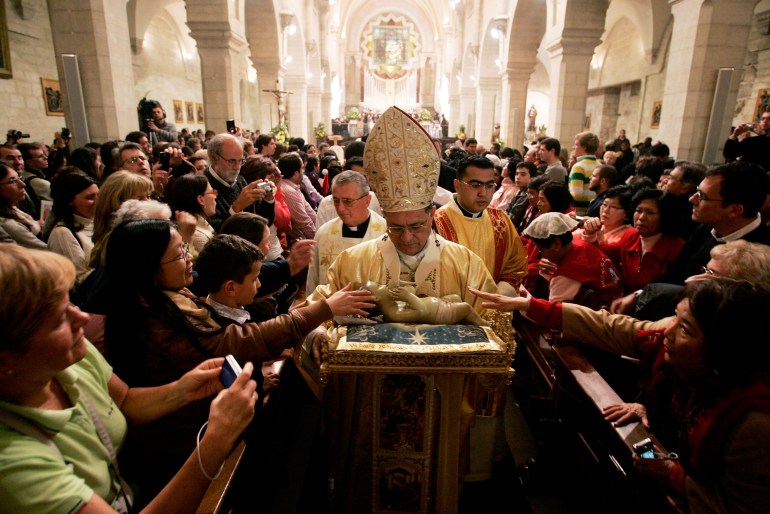
The Manger Square in Bethlehem is also decorated with a large Christmas tree and performances are held there. This year, there is no Christmas tree at Manger Square. Instead, “the civil society and some artists are working on a new kind of crib that is made out of rubble as a sign to what’s happening in Gaza”, said Raheb. He added that a video will be screened on the wall of the Nativity Church, showing what is happening in Gaza.
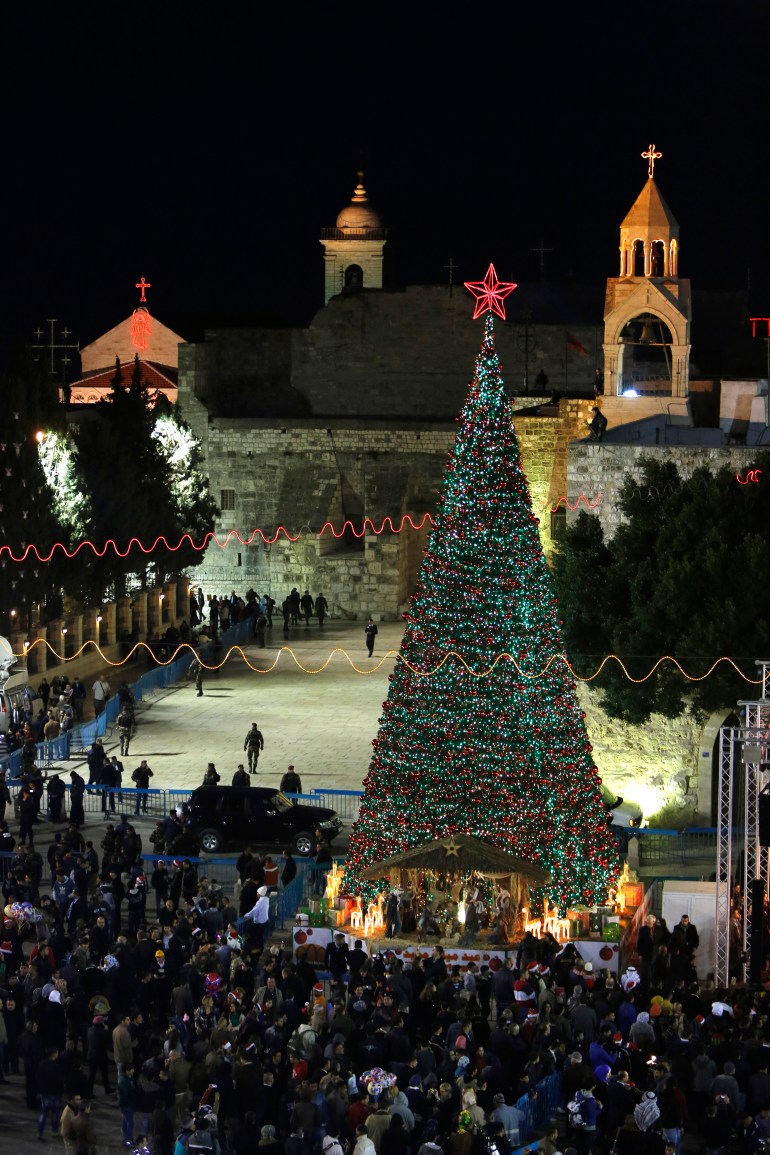
As a child, Isaac would excitedly visit Jerusalem with his parents for Christmas shopping. Several markets sell festive clothes and decorations for the holiday season. It is a tradition to buy the best clothes from Jerusalem and save them for Christmas.
“You know how in America you go to a big mall? We used to go to Jerusalem. We can’t any more,” Isaac said, alluding to the stringent permit rules in the region, which constrict the mobility of Palestinians.
Christmas is a time when families meet, in Palestine and elsewhere. While family could mean a small group of immediate relatives in the West, “When I say ‘family’ in Bethlehem, I say all 200 or so members of the Isaac family in our town – the clan,” said Isaac.
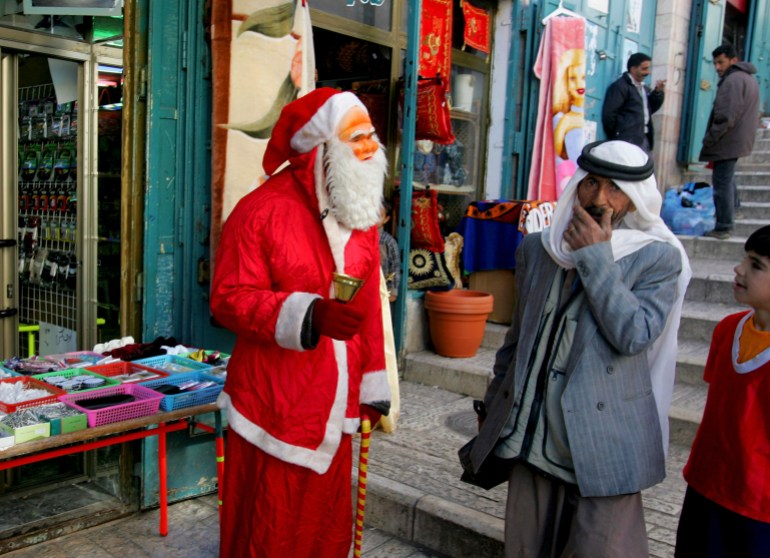
After an initial large gathering of all family members, individual homes are visited. Feasts of rice and meat are enjoyed and homemade desserts and delicacies are exchanged. These include ka’ek, or ma’amoul – semolina shortbread cookies filled with dates or nuts.
Large Christmas trees are a cynosure in every church, where parties and banquets are organised. This year, the parties have been cancelled and “no one is in the mood to … decorate a Christmas tree”, Isaac said.
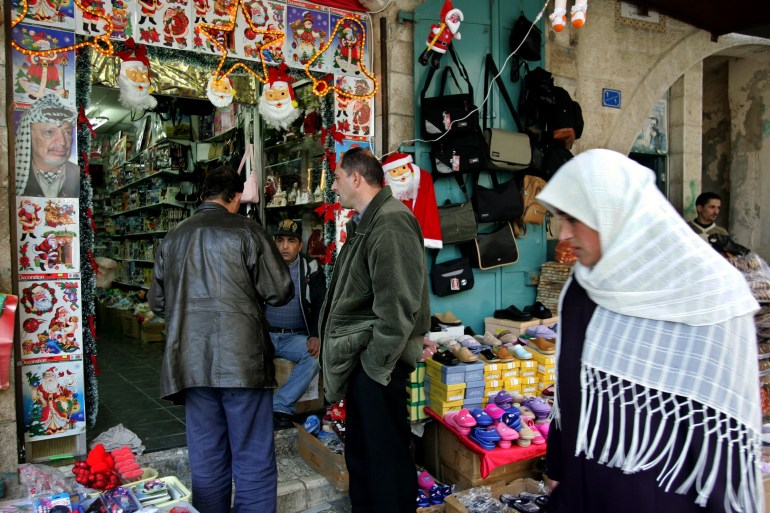
Do Muslims celebrate Christmas in Palestine?
Isaac explained that Christmas is a national holiday for all Palestinians, not just a Christian holiday. The Palestinian Authority considers it a national holiday and government offices are typically closed on Christmas day.
Several Palestinian Muslims visit Bethlehem on Christmas to attend the parade and take pictures with the Christmas tree.
“Jesus was from Bethlehem, after all. And this means a lot to us as Palestinians,” said Isaac.

World
Germany's FM visits Kyiv amid Russian offensive on Ukraine's east

Annalena Baerbock renewed calls for partners to send more air defence systems to Ukraine, although Germany’s own deliveries have been slow.
Germany’s foreign minister arrived in Kyiv on Tuesday in the latest public display of support for Ukraine by its Western partners.
Annalena Baerbock renewed Berlin’s calls for partners to send more air defence systems as Ukraine’s depleted troops are trying to hold off a fierce Russian offensive along the eastern border in a critical phase of the war.
“The Russian attacks are directly targeted at the civilian infostructure. Infrastructure like electricity is what you need for daily life, and air defence is so important, but we still need way more air defence because some of the rockets and missiles could be brought down by air defence, but obviously not all of them,” Baerbock said in Kyiv.
“It’s directly and strategically a direct attack on infrastructure to enable the life and survival here in Ukraine, and this is why I am calling worldwide to increase the air defence support, but also to increase support for reconstruction.”
Germany is the second-biggest supplier of military aid to Ukraine after the US. In 2023, it provided around €5 billion in military assistance.
Recently, Berlin pledged a third US-made Patriot battery for Ukraine as Kyiv faces a shortfall of air defences against the ongoing Russian onslaught.
The country has been resisting appeals from Ukrainian officials to provide Ukraine with the coveted Taurus missiles, which have a range of up to 500 kilometres.
Amongst other reasons, German Chancellor Olaf Scholz has claimed that these would involve sending troops directly into Ukraine, which would encourage a direct retaliation from Russia.
Ukraine’s ability to defend itself ‘compromised’
Ukrainian President Volodymyr Zelenskyy has insisted that air defence systems are needed more than ever as the Kremlin’s forces focus their efforts on the eastern Donetsk province and the northeastern Kharkiv region.
“These US and Western policies are severely compromising Ukraine’s ability to defend itself against current Russian offensive operations in northern Kharkiv (region) or any area along the international border where Russian forces may choose to conduct offensive operations in the future,” the Institute for the Study of War said in an assessment late Monday.
Regarding Ukraine’s prospective EU membership, Baerbock said that Ukraine joining the bloc would be “the necessary geopolitical consequence of Russia’s illegal war of aggression.”
Ukraine has made “impressive progress” and must not let up on reforms to the judicial system, fighting corruption and media freedom, Baerbock stated.
Germany is set to host a reconstruction conference for Ukraine next month as it looks to help rebuild the country following the war.
World
Protesters block New Caledonia roads as French police pour in

World
Ex-Israeli PM calls for defunding ICC after court requests arrest warrant for Netanyahu over ‘war crimes’
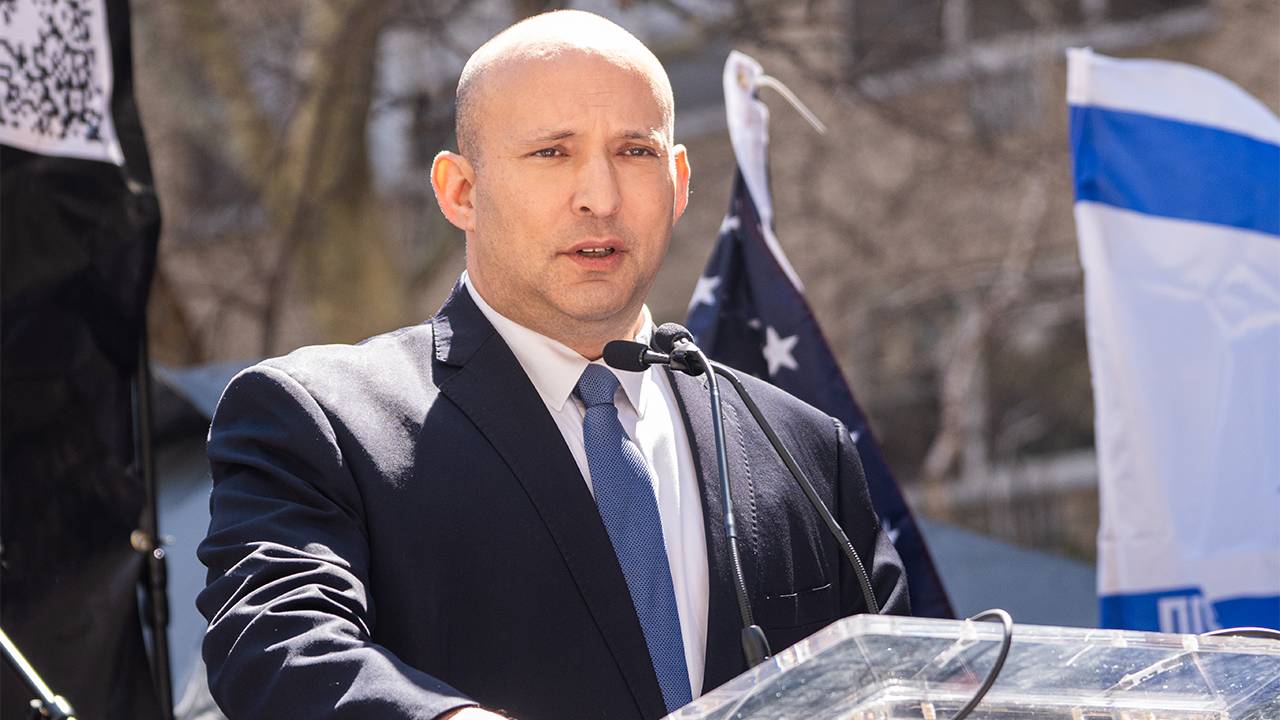
Former Israeli Prime Minister Naftali Bennett on Monday called for “decent nations” to defund the International Criminal Court (ICC) after a court prosecutor filed applications for arrest warrants against Israeli Prime Minister Benjamin Netanyahu, Defense Minister Yoav Gallant and Hamas leaders for alleged “war crimes.”
Prosecutor Karim Khan said his office had collected evidence to give “reasonable grounds” to believe Netanyahu and Gallant “bear criminal responsibility for… war crimes and crimes against humanity committed on the territory of the State of Palestine.”
Khan said those alleged crimes include “starvation of civilians as a method of warfare” and “intentionally directing attacks against a civilian population.”
He said he is also seeking arrest warrants for Hamas leader Yahya Sinwar, its top political leader Ismail Haniyeh, and its military commander Mohammed Deif.
AMAL CLOONEY PLAYED KEY ROLE IN ICC ARREST WARRANTS FOR NETANYAHU, HAMAS LEADERS
Former Prime Minister of Israel Naftali Bennett speaks at the “Bring Them Home” rally in support of Israeli hostages outside the UN Headquarters on April 07, 2024 in New York City. (Noam Galai/Getty Images)
Bennet said the prosecutor’s request was “a moment of shame for the ICC and the world community” and provided “a huge boost to global Jihadi terror.”
“An ICC that compares the executor of a deliberate murderous attack that included raping women and burning babies, with those who are defending themselves against it, is better off not existing,” Bennett said. “It’s time for the decent nations to defund the ICC.”
He included the hashtag: “DefundTheICC.”
Netanyahu and other Israeli leaders condemned the move as disgraceful and antisemitic. U.S. President Joe Biden also lambasted the prosecutor and supported Israel’s right to defend itself against Hamas.
A panel of three judges will decide whether to issue the arrest warrants and allow a case to proceed. The judges typically take two months to make such decisions.
Israel is not a member of the court, so even if the arrest warrants are issued, Netanyahu and Gallant do not face any immediate risk of prosecution. But the threat of arrest could make it difficult for the Israeli leaders to travel abroad.
Fox News Digital’s Greg Norman and The Associated Press contributed to this report.
-

 News1 week ago
News1 week agoSkeletal remains found almost 40 years ago identified as woman who disappeared in 1968
-

 Movie Reviews1 week ago
Movie Reviews1 week ago“Kingdom of the Planet of the Apes”: Disney's New Kingdom is Far From Magical (Movie Review)
-

 World1 week ago
World1 week agoIndia Lok Sabha election 2024 Phase 4: Who votes and what’s at stake?
-

 World1 week ago
World1 week agoUkraine’s military chief admits ‘difficult situation’ in Kharkiv region
-

 World1 week ago
World1 week agoCatalans vote in crucial regional election for the separatist movement
-

 Politics1 week ago
Politics1 week agoNorth Dakota gov, former presidential candidate Doug Burgum front and center at Trump New Jersey rally
-

 News1 week ago
News1 week agoTrump, Reciting Songs And Praising Cannibals, Draws Yawns And Raises Eyebrows
-

 Movie Reviews1 week ago
Movie Reviews1 week agoAavesham Movie Review


